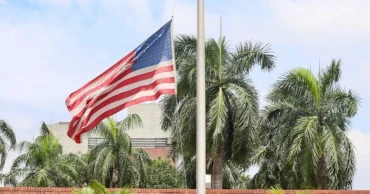9/11
US flag flies at half-mast remembering 9/11, legacy of Queen Elizabeth II
The flag of the US Embassy in Dhaka has been kept at half-mast today (September 11) remembering the victims who died in the terrorist attacks of September 11, 2001 and life and legacy of Queen Elizabeth II.
“We remember the 2,996 victims who died in the terrorist attacks of September 11, 2001,” said the US Embassy in a message on Sunday.
Read:Bangladesh, US host 46th Indo-Pacific Army Management Seminar Monday
No matter how much time passes since that tragic event, the US Mission in Dhaka said, adding that they shall never forget them or the families that suffered such great loss.
The US Embassy also remembered the life and legacy of Queen Elizabeth II.
“We join people around the world in mourning her passing, and we will forever be inspired by the memory of her service, leadership, and friendship,” said the US Embassy.
Read:Momen mourns UK's longest-serving monarch Queen Elizabeth II's death
3 years ago
9/11 : Did Al-Qaeda accelerate the West's decline?
The consequences of the 9/11 attack were clear. The US would go on to wage a “War against Terror” and end up in the Middle East and Afghanistan. Al-Qadea was confronted, the Taliban ousted and Osama was put on the run. The world was split between “Us and Them “and the US infantry looked more intent than ever before. Bin Laden ultimately was killed in Pakistan, the faithless ally of the US and the supposed revenge was had. But now, 2 decades later, a lot of analysts including Western experts are also asking if the West won in full or did Osama Bin Laden inflict a wound from which it has not recovered.
Read: ‘Don’t focus on hate’: World marks 20th anniversary of 9/11
9/11 forced the West into unwinnable wars both in Afghanistan and later in Iraq and Syria. As events show, both were disasters for them. The recent departure of the US from Afg in a shambolic way is a grim symbol of the fall since its peak in 2001. The invasion of Iraq on the grounds that Saddam was hiding weapons of mass destruction that could cause a second 9/11 is probably an even worse departure waiting to happen.
And in both Afghanistan and Iraq, NATO forces travelled with their US fellows into a hole in which all were stuck. Never has the West looked more inept.
An expiring power
The West was weakening from much earlier though, as the financial crisis of 2008 showed. Its economy had become linked to the deregulation of the 1980s and the mortgage boom of the 1990s. However, its brand was at its shiniest in 2001, even if the product was edging towards an expiry date. The Berlin Wall and Russian socialism had both died and the West was chirping loudly. But the world had changed neither democracy nor regime changes could no longer be ordered off the menu. The West got involved in war after war and chased a phantom called “ Islamic” terrorism which the West including Russia didn’t see was a reaction to its own policies and wars.
At least 6,000 British and American servicemen, as well as perhaps 200,000 Afghans and a similar number of Iraqis have died in the most futile wars on earth. The consequence is that “democracy” is no longer available on the shelf and the White Knight image that the West sold of itself is today a figure of scorn, nothing more or less.
The lies of the US to attack Iraq, the prisoners in Guantanamo and Abu Ghraib have been stamped deeply into the global memory.
Read: From 9/11′s ashes, a new world took shape. It did not last.
After all the killing and wars the Taliban is back, the US wants to depart from Iraq knowing it may mean a takeover by the IS, Iran suffers due to sanctions but is a major player in the Middle East and US leadership is not visible anywhere.
China’s rise was perhaps inevitable but it took every advantage and every mistake the West did. Today, it has become the “strongest” power without waging any wars and is near-about the Taliban’s best friend.
The West is a shadow of what it was 20 years ago. It just isn’t smart enough to cope with the new world. And sadly for the West many of the causes can be traced to the events of 9/11. That was a hit which Al-Qaeda certainly intended, and in that they succeeded.
4 years ago
US marks 20 years since 9/11, in shadow of Afghan war’s end
Twenty years ago, the 11th of September dawned as just a date. By midnight, it was 9/11, the staggering starting point for a new era of terror, war, politics, patriotism and tragedy.
The U.S. marks the milestone anniversary Saturday under the pall of a pandemic and in the shadow of a frantic withdrawal from Afghanistan, which fell to the same militant rulers who gave safe haven to the plotters of the 2001 attacks.
“It’s hard because you hoped that this would just be a different time and a different world. But sometimes history starts to repeat itself and not in the best of ways,” said Thea Trinidad, who lost her father in the attacks and has signed up to read victims’ names at the ceremony at ground zero in New York.
President Joe Biden is scheduled to travel to all three attack sites: New York’s World Trade Center, the Pentagon and a field near Shanksville, Pennsylvania.In a video released Friday night, he mourned the ongoing losses of 9/11.
“Children have grown up without parents, and parents have suffered without children,” said Biden, a childhood friend of the father of a Sept. 11 victim, Davis Grier Sezna Jr.
But the president also spotlighted what he called the “central lesson” of Sept. 11: “that at our most vulnerable ... unity is our greatest strength.”
Former President George W. Bush, the nation’s leader on 9/11, is due at the Pennsylvania memorial and his successor, Barack Obama, at ground zero. The only other post-9/11 U.S. president, Donald Trump, is planning to be in New York, in addition to providing commentary at a boxing match in Florida in the evening.
Other observances — from a wreath-laying in Portland, Maine, to a fire engine parade in Guam — are planned across a country now full of 9/11 plaques, statues and commemorative gardens.
Using hijacked planes as missiles, the assailants inflicted the deadliest terrorist attacks on U.S. soil, taking nearly 3,000 lives, toppling the twin towers and ushering in an age of fear.Security was redefined, with changes to airport checkpoints, police practices and the government’s surveillance powers. In the years that followed, virtually any sizeable explosion, crash or act of violence seemed to raise a dire question: “Is it terrorism?” Some ideological violence and plots did follow, though federal officials and the public have lately become increasingly concerned with threats from domestic extremists after years of focusing on international terror groups in the wake of 9/11.
New York faced questions early on about whether it could ever recover from the blow to its financial hub and restore a feeling of safety among the crowds and skyscrapers. New Yorkers ultimately rebuilt a more populous and prosperous city but had to reckon with the tactics of an empowered post-9/11 police department and a widened gap between haves and have-nots.
READ: From 9/11′s ashes, a new world took shape. It did not last.
A “war on terror” led to invasions of Iraq and Afghanistan, where the longest U.S. war ended last month with a hasty, massive airlift punctuated by a suicide bombing that killed 169 Afghans and 13 American service members and was attributed to a branch of the Islamic State extremist group. The U.S. is now concerned that al-Qaida, the terror network behind 9/11, may regroup in Afghanistan.
Two decades after helping to triage and treat injured colleagues at the Pentagon on Sept. 11, retired Army Col. Malcolm Bruce Westcott is saddened and frustrated by the continued threat of terrorism.
“I always felt that my generation, my military cohort, would take care of it — we wouldn’t pass it on to anybody else,” said Westcott, of Greensboro, Georgia. “And we passed it on.”
For Angelique Tung, who was at the trade center for a business meeting on 9/11 and escaped down 77 flights of stairs, the U.S. pullout from Afghanistan stirred empathy for troops who served there. Some now wonder whether their efforts and sacrifices made a difference, which makes Tung think of a question she has asked herself since surviving Sept. 11.
“I hope that, after 20 years, other people are asking that question: What good can come from this?” said Tung, of Wellesley, Massachusetts.
Sept. 11 propelled a surge of shared grief and common purpose, but it soon gave way.
Muslim Americans endured suspicion, surveillance and hate crimes. The quest to understand the catastrophic toll of the terror attacks prompted changes in building design and emergency communications, but it also spurred conspiracy theories that seeded a culture of skepticism. Schisms and resentments grew over immigration, the balance between tolerance and vigilance, the meaning of patriotism, the proper way to honor the dead, and the scope of a promise to “never forget.”
Trinidad was 10 when she overheard her dad, Michael, saying goodbye to her mother by phone from the burning trade center. She remembers the pain but also the fellowship of the days that followed, when all of New York “felt like it was family.”
READ: 9/11 artifacts share ‘pieces of truth’ in victims’ stories
“Now, when I feel like the world is so divided, I just wish that we can go back to that,” said Trinidad, of Orlando, Florida. “I feel like it would have been such a different world if we had just been able to hang on to that feeling.”
4 years ago
US to commemorate 9/11 as its aftermath extends and evolves
New York, Sept 11 (AP/UNB) — Americans are commemorating 9/11 with mournful ceremonies, volunteering, appeals to "never forget" and rising attention to the terror attacks' extended toll on responders.
6 years ago


.jpg)



